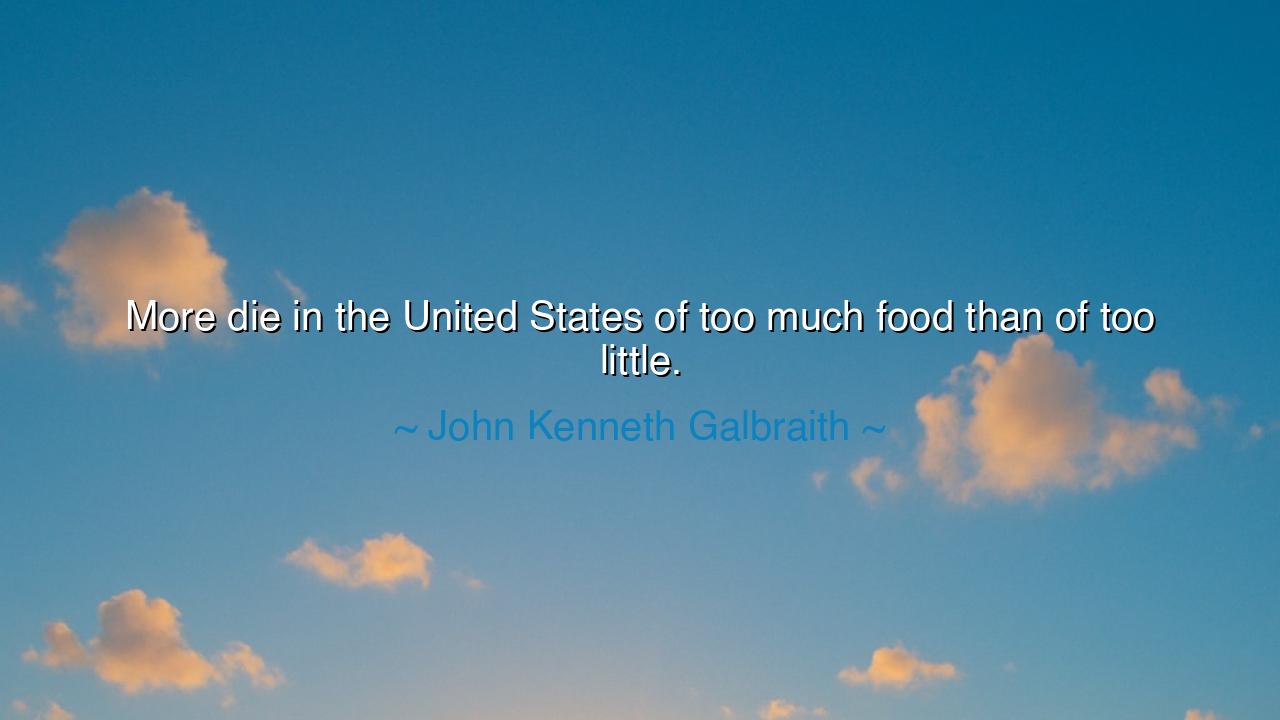
More die in the United States of too much food than of too






Host: The café was calm, the soft murmur of background conversations blending with the occasional clink of coffee cups. The warm afternoon light filled the room, casting a soft glow across the table where Jack and Jeeny sat. Jack seemed lost in thought, his fingers absentmindedly tracing the rim of his coffee cup. Jeeny, noticing his reflective mood, waited for him to speak.
Host: After a few moments, Jack looked up, his voice thoughtful.
Jack: “I came across a quote from John Kenneth Galbraith today. He said, ‘More die in the United States of too much food than of too little.’ It got me thinking about how, in many places, we’re dealing with the opposite problem of what many other parts of the world face — overconsumption rather than scarcity. Galbraith’s statement is a stark reminder that we often overlook the dangers of excess, especially when it comes to something as basic as food. Do you think we focus too much on scarcity and not enough on the problems caused by abundance?”
Jeeny’s eyes softened, clearly reflecting on his words. She leaned in slightly, her voice calm but filled with insight as she responded.
Jeeny: “I think Galbraith’s quote is incredibly powerful because it shifts the focus from what we’re often told about scarcity — the idea that hunger and deprivation are the primary global issues — to the hidden dangers of overindulgence. In a world where so many people are struggling with issues like obesity, chronic disease, and poor nutrition, it’s easy to forget that abundance can be just as dangerous as lack. In societies where food is readily available, we face a different kind of crisis: one where excess leads to health problems, emotional issues, and a disconnection from what food is really meant to provide — nourishment.”
Host: Jack nodded slowly, clearly reflecting on her words. The quiet rhythm of the café seemed to deepen as he considered the implications of the overconsumption issue.
Jack: “So, it’s not just about making sure people have enough to eat, but about making sure what they have is healthy and not harmful. Abundance isn’t always a positive thing if it leads to negative health outcomes.”
Jeeny smiled gently, her eyes steady with understanding as she responded.
Jeeny: “Exactly. We often think of hunger as the biggest global issue, and while it’s still a critical concern, overconsumption is just as dangerous. It’s about striking a balance — having access to the right quality of food, not just an abundance of it. In many ways, it’s about fostering awareness of what we eat, how much we eat, and the consequences of our choices. In a world of plenty, the real challenge is learning to navigate that abundance in a healthy, sustainable way.”
Host: Jack leaned back, a small smile forming as the realization settled in. The world outside the café continued its usual rhythm, but inside, their conversation had opened up a new perspective on the impact of abundance.
Jack: “So, it’s not just about making sure people have enough food, but about making sure they’re choosing quality over quantity. Too much of something, even something as basic as food, can be just as harmful as not having enough.”
Jeeny nodded, her smile warm with affirmation.
Jeeny: “Exactly. It’s about making healthier choices and understanding the impact that overindulgence can have on our bodies and minds. A world of excess can be just as dangerous as one of deprivation, and it’s important that we take the time to educate ourselves and make choices that contribute to overall well-being.”
Host: The conversation lingered, a quiet understanding that the issues of overconsumption and excess deserve just as much attention as scarcity and lack. Jack and Jeeny shared a deeper appreciation for the importance of mindful consumption in a world where abundance can sometimes lead to harm. The world outside continued on, but inside the café, there was a renewed awareness of the need for balance in the way we approach food and health.






AAdministratorAdministrator
Welcome, honored guests. Please leave a comment, we will respond soon